

Section

Back
Also known as the “feel good hormone”, serotonin is a chemical messenger that affects our emotional health, digestion, bone health, brain function, blood, memory, and more.
It’s also well-known for its effects on mood, although new research has challenged what we thought we knew about serotonin and mental health.
Regardless, many people are interested in how to increase serotonin naturally to benefit the body, mind, and spirit.
This article explains how to use herbs, foods, rituals, and more.
What Is Serotonin And What Does It Do?
Serotonin is a chemical messenger (neurotransmitter)that carries messages throughout the nervous system.
Some people also consider it a hormone.
Serotonin plays a role in emotional well-being, blood vessel function, neurological function, bone health, digestion, eye health, central nervous system function, stress response, sleep, and more.
It is also a precursor to melatonin, the body’s master sleep hormone.
Serotonin is made from tryptophan, an essential amino acid from protein, plus the chemical reactor tryptophan hydroxylase. Put them together and you get 5-hydroxytryptophane, aka 5-HT, aka 5-HTP, aka serotonin.

What Is Tryptophan?
As you just learned, tryptophan is an amino acid essential for the formation of serotonin in the brain and gut.
It’s also a precursor to melatonin, your body’s master sleep hormone.
Although serotonin is not found in foods, tryptophan is, which is why tryptophan-rich foods and supplements are often recommended to boost serotonin and promote sleep.
A prime example of this is turkey, which contains tryptophan and is often blamed for creating a blissful, sleepy, and satisfied state after Thanksgiving dinners in North America.
We’ll discuss more about this in subsequent sections.
Where Is Serotonin Produced?
Although most people associate serotonin with the brain, new research has shown it is primarily produced in the gut, shedding new light on the gut-brain connection in digestive, mental, and emotional health.
Serotonin is also produced in the brain and is found in blood platelets and the digestive tract.
How Can I Raise My Serotonin Levels?
Many people are curious about ways to raise serotonin levels naturally, especially for emotional well-being and sleep.
Before we go on, it’s important to re-emphasize that what was once considered “settled science” about serotonin and mental/emotional health has recently been challenged.
That doesn’t change the fact that serotonin is a key player in nervous system function, brain health, the gut-brain axis, sleep, and emotional wellness.
However, it does suggest that there’s still a lot to learn about how serotonin works on body and mind.
In Ayurveda, for example, the goal is not to “boost” serotonin, but to support the body’s digestion, gut health, cognitive function, nervous system, and Prana (energy) so it can produce just the right amount of serotonin for individual vitality.
Other systems of wellness take a more direct approach and recommend foods, supplements, and practices that create or activate tryptophan, which in turn, supports serotonin production; while others focus on gut health as an avenue to increase serotonin naturally.
Regardless, studies suggest the following herbs, foods, and rituals that may help increase serotonin naturally.

Herbs to Increase Serotonin Naturally
For millennia, herbs have been used to support every aspect of physical, mental, and emotional health.
Although ancient herbalists may not have known how their treasured plants worked, new research has shown several Ayurvedic and Western herbs may help boost serotonin.
The following are four Ayurvedic herbs may naturally support your body’s feel good chemistry.
Also known as “Brahmi”, Bacopa is a cherished rasayana (rejuvenator), adaptogen (stress reliever), and brain and nervous system tonic in Ayurveda.
It’s often recommended to support and preserve cognitive health, emotional well-being, and to reduce stress.
Regarding serotonin, research has shown the active plant compounds in Bacopa, known as bacosides, can help regulate various neurotransmitters, including serotonin and dopamine (the pleasure-inducing neurotransmitter), possibly via its effects on up-regulating tryptophan.
Learn more in: Bacopa Benefits For Brain Health

Ashwagandha is one of Ayurveda’s best-known herbal adaptogens for promoting sleep, reducing stress, supporting hormonal function, and creating calm focus.
It’s also commonly recommended to promote mental and emotional well-being, especially during times of stress.
Although several studies have linked the active plant compounds, withanolides, Ashwagandha, to better emotional health and sleep, the exact effects of Ashwagandha on serotonin are not fully understood.
However, preliminary research suggests Ashwagandha may help increase serotonin naturally in sleep-deprived animals, but more research is needed.
Related reading: Ashwagandha For Sleep Or Energy? Both, Please
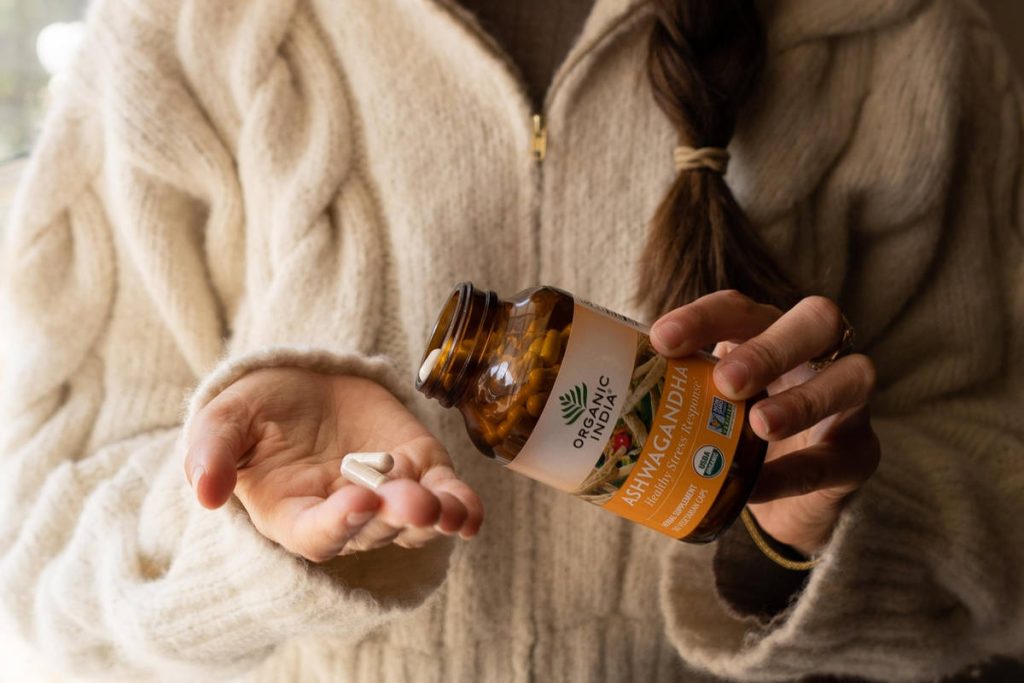
Known as “The Queen Of Herbs” and “Holy Basil,” Tulsi is beloved in Ayurveda for its calming, nourishing, immune-supportive, and stress-reducing properties.
Also considered an adaptogen and rasayana (rejuvenator), Tulsi is commonly recommended in Ayurveda to promote mental and emotional clarity and focus as well as to promote happiness and spiritual enlightenment.
Although Tulsi is not as well studied as Ashwagandha for mental-emotional health, emerging research suggests it may act on serotonin and dopamine pathways, promote normal cortisol (the body’s master stress hormone), and support a normal neurological inflammatory response, both of which may help promote a calmness and contentment of mind and body.
Discover more about the queen of herbs in: 5 Surprising Tulsi Tea Benefits
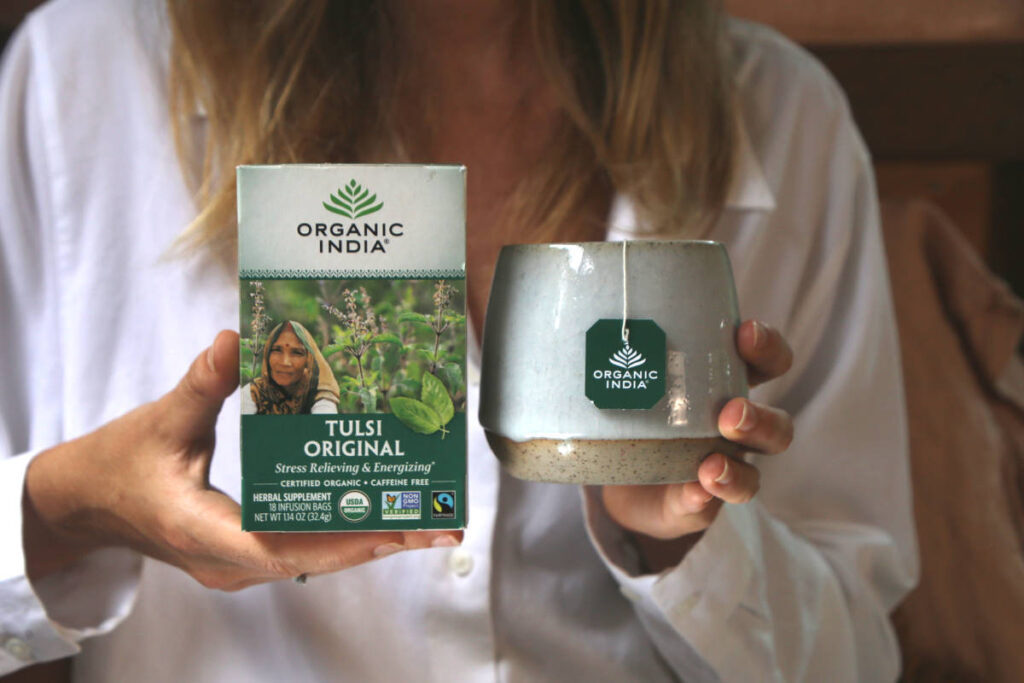
Turmeric is one of the most-studied plants of all time, and is used extensively in Ayurvedic and Western wellness practices and modern medicine.
In Ayurveda, Turmeric is considered a multifaceted herb with applications in traditional herbalism and culinary recipes.
In the West, Turmeric is best known for its beneficial effects on inflammatory response, minor pain management, and promoting cellular health.
What few people realize is that Turmeric can also provide mental and emotional benefits, including potentially increasing serotonin.
Specifically, research has shown the primary active plant compound Curcumin has been shown to help regulate and increase serotonin and dopamine levels.
Is there anything Turmeric can’t do?!
Learn more about this golden spice in: What is Kandhamal Turmeric? All About This Golden Spice
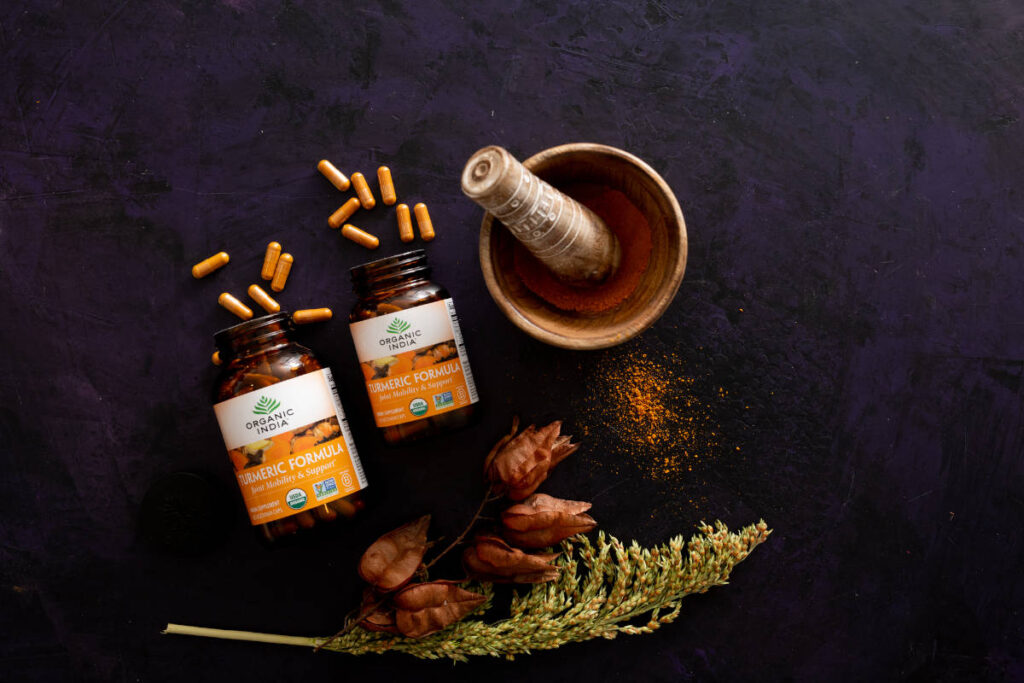
What Food Is Best For Serotonin?
Some research suggests that eating foods containing tryptophan (a precursor of serotonin) may help increase feel-good hormones and serotonin naturally in the body.
Foods high in tryptophan include:
- Turkey and other poultry
- Salmon
- Spinach
- Eggs
- Nuts & seeds
- Chickpeas
- Milk
- Soy products
- Pineapple
It’s also important to note that tryptophan requires carbohydrates to be transported to the brain and make serotonin.
Carbohydrates, especially fiber-rich carbs, are also essential for the production of friendly gut bacteria, which also play a role in serotonin production.
The bottom line is that although many protein-rich foods contain tryptophan, carbohydrates are also needed to boost serotonin levels.
This is why many people feel better when they eat carbohydrates versus a very low to no-carb diet, carbs are essential for healthy serotonin production and function (woo hoo!)

Rituals To Increase Serotonin Naturally
As always, taking herbs (or any natural or synthetic substance) is not a substitute for addressing lifestyle factors that may be inhibiting your health and happiness.
Although everyone is different, common causes of emotional “fever” may include excess stress, grief and loss, lack of community and friendship, and an absence of space for inner calm, reflection, and connection with oneself and what is larger than oneself.
We cannot control circumstances, but we can control how we react to them and exist and cope within them, which is where rituals come in.
Plus, certain rituals have been shown to help increase serotonin levels naturally!
Some examples include:
Looking for inspiration to create your own rituals? Check out: 10 Life Changing Morning Rituals – Organic India
What Depletes Serotonin?
There is much to learn about what depletes serotonin, including why some people have lower levels than others.
Still, research (and commonsense) suggests various factors may impact serotonin levels, including:
- Ultra-processed foods, especially those with artificial sweeteners and excitotoxins, like MSG
- A lack of amino acids in the diet, especially tryptophan
- Gut health issues
- Genetics
- Chronic stress
- Lack of sun exposure
- Trauma
- Certain medications, such as antidepressants and certain cholesterol-lowering drugs
- Hormonal changes
- Caffeine, alcohol, and nicotine
Not everyone will experience side effects of lowered serotonin from these factors, but they are worth noting.

Where To Start Increasing Serotonin Naturally
If you’re looking for ways to increase serotonin naturally to help with a mental health disorder and/or are taking medication that affects serotonin, it’s essential to consult your doctor.
If you’re otherwise healthy, not on serotonin-modifying medications, and interested in increasing serotonin to support sleep, gut health, or general emotional well-being, herbs and lifestyle practices are a great place to begin.
For example, you could begin with a serotonin-supportive ritual, such as practicing yoga or mindfulness meditation.
If you find this helpful, try adding a cup of Tulsi Tea or Tulsi Ashwagandha Tea.
Tulsi tea is also known as “liquid yoga” for its effects on enhancing meditation and promoting exercise recovery.
Plus, it’s great for sleep and stress.
Add in some extra tryptophan-rich foods, and you have a solid plan to start increasing serotonin levels naturally.
You Can Find The Herbs Discussed In This Article by Clicking the Links Below.
- Bacopa (teas, capsules)
- Ashwagandha (capsules, teas, gummies, bulk herbs)
- Tulsi (teas, bulk herb, capsules)
- Turmeric (beverages, capsules, bulk herbs)
For more Ayurvedic tips for emotional well-being, check out the following articles:
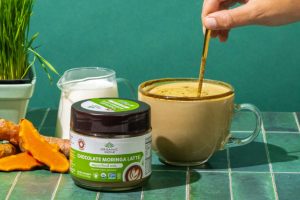
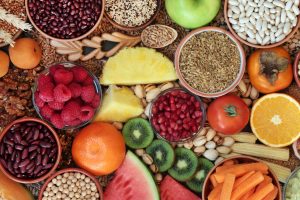





 Kristen Boye is a freelance natural health and green living writer, copywriter, and editor. Kristen was raised on an organic farm in British Columbia which inspired her life’s work. She holds a Bachelor’s Degree in Natural Health, is a Certified Natural Foods Chef, a medicinal herb farmer, natural foods advocate, and is obsessed with writing, homesteading, researching, regenerative agriculture, and words in general. Kristen lives with her husband and two children on their medicinal herb farm in Western North Carolina. Visit her online at:
Kristen Boye is a freelance natural health and green living writer, copywriter, and editor. Kristen was raised on an organic farm in British Columbia which inspired her life’s work. She holds a Bachelor’s Degree in Natural Health, is a Certified Natural Foods Chef, a medicinal herb farmer, natural foods advocate, and is obsessed with writing, homesteading, researching, regenerative agriculture, and words in general. Kristen lives with her husband and two children on their medicinal herb farm in Western North Carolina. Visit her online at: